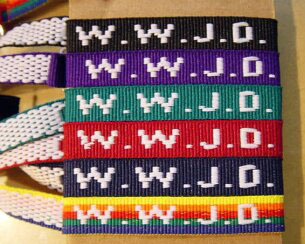You cannot escape acronyms and abbreviations in Germany. Germans love to make up long, long, long words. Remember Arbeitsunfähigkeitsbescheinigung? However, having made up those words, they then, like anyone else, realized that if everyone went around saying those words to each other it would take all day to buy stamps at the post office or drop off some documents at city hall (as opposed to the perfectly acceptable time frame of half a day). So, they condensed those tongue-twistery words back on themselves into indecipherable acronyms such as AB, AW, and WG, and cute nicknames like Hiwi, Azubi, Bufdi, and Kripo that sound like the cast of a British children's show.
While it's all very well to use AB for Arbeitsunfähigkeitsbescheinigung or WG for Wohngemeinschaft, you do have to stay on your toes or consult a specially-made dictionary so as not to confuse them with BA, or answering machine, or WC, which means toilets. I had a very, very confusing week where my boss told me I had to start an AG at my work, which I took to mean an Aktiensgemeinschaft, or business. What? I thought. But I had a job, didn't I? Was this some weird Great Leap Forward plan to save the Euro? Was I expected to start running a scrap metal smelter from my balcony to help pay off Greece's debts? However, it quickly became clear to me (before I started rewatching The Apprentice, thank goodness) that all I had to do was start an Aktivitätsgemeinschaft, a club, as a sign of interest in my workplace. (Now that I think about it, this seems like the kind of team-building program that Mao would have approved of.) It had also become clear to my boss that my fluency in German wasn't what she had thought it to be.
Worst of all, there is nothing to be done. You can't guess what the acronym means. At least with a compound word, you can have two out of three words and pretty much guess at the meaning from the context. With an acronym you are flying blind. Something like AW could be any combination of words beginning with A stuck together with words beginning with W. Or it could be a trick, which it is (ha!), and actually stand for Antwort, or answer, which, by my standards is a perfectly normal length word that doesn't need to be shortened by picking apart the syllables into an acronym. It's as if you were to behave absolutely ridiculously by taking a word like "number" in English and fooling yourself into believing you were making it more clear and manageable by shortening it to something stupid like "No." Oops. Well. Bad example.
image via scribblesandscratches.wordpress.com
Worst of all, there is nothing to be done. You can't guess what the acronym means. At least with a compound word, you can have two out of three words and pretty much guess at the meaning from the context. With an acronym you are flying blind. Something like AW could be any combination of words beginning with A stuck together with words beginning with W. Or it could be a trick, which it is (ha!), and actually stand for Antwort, or answer, which, by my standards is a perfectly normal length word that doesn't need to be shortened by picking apart the syllables into an acronym. It's as if you were to behave absolutely ridiculously by taking a word like "number" in English and fooling yourself into believing you were making it more clear and manageable by shortening it to something stupid like "No." Oops. Well. Bad example.
image via scribblesandscratches.wordpress.com




